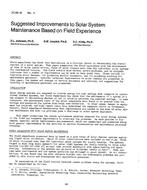Multi-system air conditioners that consist of one outdoor unit and several indoor units can control the temperature in individual rooms, and they are widely applied in Japanese buildings. However, their operation is limited to a single mode – heating or cooling – at one time. Some rooms in a building should be cooled even in winter because of computers and other electronic machinery, and, in that case, concurrent heating and cooling is necessary, which cannot be achieved with a conventional multi-system air conditioner. Thus, a new multi-system air conditioner has been developed so that a suitable operating mode can be selected for each indoor unit independently, hence, concurrent heating and cooling is possible. The new system has only one outdoor unit with a compressor, and several indoor units are connected to the outdoor unit through a junction unit. Capacity controls are achieved by changing the frequency of the compressor and the air flow rate of the outdoor heat exchanger. Describes the configuration, basic operating methods, and experimental results of the new multi-system air conditioner. The experimental results indicated a maximum 40% higher coefficient of performance (COP) in the concurrent heating and cooling mode compared to single-mode operations.
KEYWORDS: unit air conditioners, temperature, heating, cooling, rooms, Japan, buildings, operations, compressors, air flow rate, heat exchangers, outdoor, indoor, coefficient of performance, air conditioning
Citation: ASHRAE Transactions, vol.97, pt. 2, Indianapolis, IN 1991
Product Details
- Published:
- 1991
- File Size:
- 1 file , 810 KB
- Product Code(s):
- D-18053


